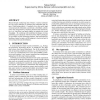Free Online Productivity Tools
i2Speak
i2Symbol
i2OCR
iTex2Img
iWeb2Print
iWeb2Shot
i2Type
iPdf2Split
iPdf2Merge
i2Bopomofo
i2Arabic
i2Style
i2Image
i2PDF
iLatex2Rtf
Sci2ools
PVLDB
2008
2008
Community-driven data grids
Beyond already existing huge data volumes, e-science communities face major challenges in managing the anticipated data deluge of forthcoming projects. Community-driven data grids target at domain-specific federations and provide a distributed, collaborative data management by employing dominant data characteristics (e. g., data skew) and query patterns to optimize the overall throughput. By combining well-established techniques for data partitioning and replication with Peer-to-Peer (P2P) technologies we can address several challenging problems: data load balancing, handling of query hot spots, and the adaption to short-term burst as well as long-term load redistributions.
Related Content
| Added | 28 Dec 2010 |
| Updated | 28 Dec 2010 |
| Type | Journal |
| Year | 2008 |
| Where | PVLDB |
| Authors | Tobias Scholl, Alfons Kemper |
Comments (0)

